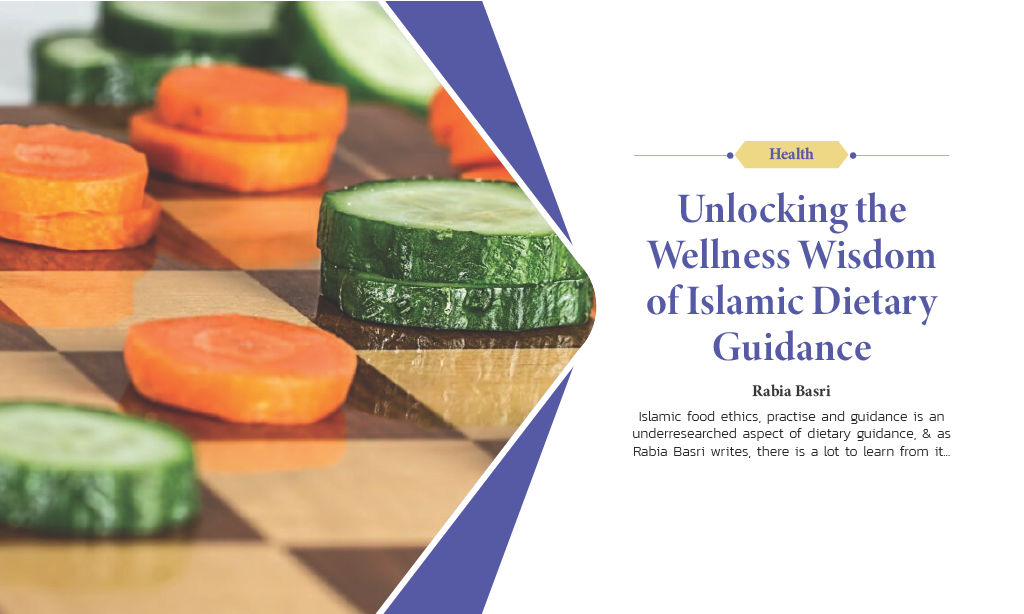Islamic food ethics, practise and guidance is an underresearched aspect of dietary guidance, and as Rabia Basri writes, there is a lot to learn from it…
In a world where the pursuit of well-being and balance has become paramount, we often find ourselves searching for the perfect dietary regimen. Amidst the plethora of diet plans and nutrition trends, we sometimes overlook an ancient source of wisdom—one that seamlessly intertwines faith, nourishment, and health. This source is none other than the profound connection between Islam, nutrition, and the timeless teachings of the Prophet Muhammad, (PBUH).
The holy Qur’an isn’t just a spiritual guide to mankind. to mankind it’s a wellspring of wisdom that imparts essential knowledge on leading a balanced and healthy life. It encourages us to eat and drink well, but not excessively, echoing the principle of moderation that weaves through Islamic teachings.
Diversity is another cornerstone of Islamic dietary guidance. The Prophet Muhammad PBUH practised what he preached, savouring a diverse range of foods that celebrated the earth’s bounty. Dates, figs, grapes, milk, honey, olive oil, vinegar, watermelon, barley, pumpkin, squash, and an array of vegetables comprised his daily meals. These foods were in their natural, wholesome, and unprocessed forms, aligning perfectly with the Prophet’s emphasis on the simplicity and natural flavours of basic meals.
At the core of these teachings lies a fundamental principle that underpins a healthier, more balanced life: moderation. Prophet Muhammad PBUH, offered invaluable guidance on the importance of mindful consumption. He advocated filling only one-third of the stomach with food, reserving another third for water, and leaving the remaining third for air. This simple yet profound advice underscores the significance of moderation in our dietary choices, making it the key to a healthier & more balanced life.
Intriguingly, Islamic tradition introduces the concept of “Tayyib” food—food that is not only delicious but also pure, healthy, and nourishing. The Quran underscores the importance of consuming both permissible (halal) and of high quality (tayyib), emphasizing the intrinsic connection between faith and food quality.
Prophet Muhammad PBUH demonstrated an unwavering fondness for simplicity. He appreciated basic, unprocessed foods, and his diet, while diverse, was rooted in fresh, home-grown, and hygienic ingredients. Some of his favourite foods, like dates and honey, carried therapeutic value. For example, the hadith mentions that consuming seven ‘Ajwa’ dates every morning could protect against poison or magic.
A heartwarming anecdote from the life of Prophet Muhammad PBUH reveals his appreciation for life’s simple pleasures. Anas, a companion of the Prophet, recounts sharing a meal with the Messenger of Allah, which consisted of barley bread, soup with pumpkin, and dry sliced beef. This meal, appreciated in good company, exemplifies the importance of gratitude and simplicity in our eating habits.
Meat consumption occupies a unique place in Islamic dietary wisdom. It is neither explicitly encouraged nor discouraged; instead, it is viewed as a luxury and a “meal of the Kings.” In the time of Prophet PBUH, meat was reserved for special occasions and considered a delicacy. This perspective encourages us to savour the luxury of meat while remaining mindful of moderation and simplicity in our dietary choices.
In today’s world, characterised by an epidemic of lifestyle-related diseases, reflecting upon the wisdom of these Islamic teachings is more crucial than ever. The prevalent trend of overindulging in low-quality meats and processed foods has led to a surge in health issues like diabetes and cancer. Agricultural practices have shifted to cater to consumers’ excessive demands, resulting in a degradation of food quality and safety.
The emphasis on consuming fresh, home-grown, and hygienic food aligns seamlessly with the principles of Islamic dietary guidance. It calls for a re-evaluation of our eating habits and a return to a more balanced and natural approach to nourishing our bodies.
Incorporating the dietary practices of Prophet Muhammad PBUH into our daily lives aligns us not only with the teachings of Islam but also sets us on a journey towards better health and well-being. While this path may require some lifestyle adjustments, the rewards are immeasurable. It is a journey that harmonises our physical and spiritual selves, paving the way for a more fulfilling life.
In a world where overindulgence in low-quality meats and processed foods has led to a surge in lifestyle-related diseases, the teachings of Islam offer an essential compass for returning to a more balanced and natural approach to nourishing our bodies. The emphasis on consuming fresh, home-grown, and hygienic food aligns perfectly with these principles. It is an invitation to embrace a lifestyle that seamlessly merges faith and nutrition, promoting a sense of well-being that transcends the physical and the spiritual.


0 Comments